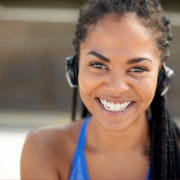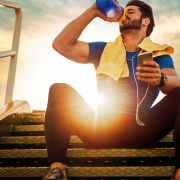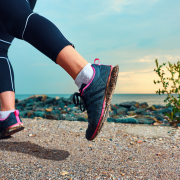The Benefits of Mindfulness Without Meditation
When we think of mindfulness, often the images that spring to mind are of sitting in a darkened room with crossed legs, deep in meditation. It is easy to think of this as all there is to mindfulness, and to not always identify with it ourselves, especially for those of us leading active lifestyles or those who have tried meditation and not found it to work.
However, excluding mindfulness practices from our routines altogether could be detrimental – the benefits of mindfulness are far reaching.
As with many elements of sports training, those who practise it can see improvements outside of their sporting life as well; mindfulness practitioners can see improvements in both empathy and compassion (1). Back in the sporting world, we can find the practice helps us better regulate our emotions, and decrease stress, anxiety, pessimism and mental fatigue (1-5). All are benefits that you can find aids you as a sportsperson, regardless of discipline.
Although different definitions of mindfulness can be found across the internet and beyond, it is best described as “moment-to-moment awareness of one’s experience, without judgement” (1). The practices that can bring about this vary, and can be active, as well as passive, more suited to the more animated and outdoorsy amongst us.
With both the holistic and sport-specific benefits on offer, mindfulness can be an attractive prospect to add into your routine. However, as not everyone finds meditation works for them, there are multiple and varied ways of introducing the benefits of mindfulness for yourself.
Binaural Beats
Binaural beats are a type of auditory stimulation that has been linked with increased focus for those listening for just twelve minutes, reducing the wandering of the mind that might occur during a long training session, for example (6).
In sport, perception of how you feel can be as important as the physical reality, and binaural beats have also been seen to improve the perception of sleep and motivation in sportspeople (7).
Guided Breathing
Guided breathing is frequently recommended as a method of stress and anxiety reduction (8,9).
By focusing on breathing, even while doing other activities, you can bring about a state of mindfulness, with the ‘moment-to-moment awareness’ of your breathing aiding relaxation and focus.
Box breathing is commonly used by the Navy SEALs as a method of staying calm and performing under pressure. This methodology is also applicable to all high performing individuals, including athletes, who will find benefit from using box breathing in preparation for a competition.
Subliminal Priming
Subliminal priming is the use of visual, auditory, or other cues that occur below the threshold of perception, such that they are only perceived subconsciously.
Priming sees the most significant effect when those using it are motivated to pursue the goal that they are priming in themselves, but can increase motivation, and feelings of self-efficacy, especially when combined with other techniques (10,11).
We developed Rewire with athletes in mind, to highlight and develop the cognitive side of sports performance.
Rewire’s Mindset Recovery system contains a range of protocols to help you enhance your performance, with binaural beats, guided breathing, and subliminal priming alongside various other neurological and psychological protocols like visualization and self-talk.
Start your free trial with Rewire today to get the benefits of mindfulness without meditation.

References
1. Davis DM, Hayes JA. What are the benefits of mindfulness? A practice review of psychotherapy-related research. Psychotherapy (Chicago). 2011 Jun; 48(2): 198-208. doi: 10.1037/a0022062.
2. Corcoran KM, Farb N, Anderson A, Segal ZV. Mindfulness and emotion regulation: Outcomes and possible mediating mechanisms. In Kring AM, Sloan DM. Emotion regulation and psychopathology: A transdiagnositc approach to etiology and treatment. New York: Guildford Press; 2010. p. 339-355.
3. Shapiro SL, Schwartz GE, Bonner G. Effects of mindfulness-based stress reduction on medical and premedical students. Journal of Behavioural Medicine. 1998 Dec; 21(6): 581-599. doi: 10.1023/a:1018700829825.
4. Rosenzweig S, Reibel DK, Greeson JM, Brainard GC, Hojat M. Mindfulness-based stress reduction lowers psychological distress in medical students. Teaching and Learning in Medicine. 2003 Sprint; 15(2): 88-92. doi: 10.1207/S15328015TLM1502_03.
5. Scott-Hamilton J, Schutte NS, Brown RF. Effects of a Mindfulness Intervention on Sports-Anxiety, Pessimism, and Flow in Competitive Cyclists. Applied Psychology: Health and Well-Being. 2016 Mar; 8(1): 85-103. doi: 10.1111/aphw.12063.
6. Axelsen JL, Kirk U, Staiano W. On-the-Spot Binaural Beats and Mindfulness Reduces the Effect of Mental Fatigue. Journal of Cognitive Enhancement. 2020; 4: 31-39. doi: 10.1007/s41465-019-00162-3.
7. Abeln V, Kleinert J, Strueder HK, Schneider S. Brainwave entrainment for better sleep and post-sleep state of young elite soccer players – A pilot study. European Journal of Sport Science. 2014; 14(5): 393-402. doi: 10.1080/17461391.2013.819384.
8. NHS. NHS. [Online].; 2018 [cited 2021 Sep 23. Available from: https://www.nhs.uk/mental-health/self-help/guides-tools-and-activities/breathing-exercises-for-stress/.
9. Isle of Wight NHS Trust. Isle of Wight NHS Trust. [Online]. [cited 2021 Sep 24. Available from: https://www.iow.nhs.uk/Downloads/Chronic%20Pain/Stress%20and%20Relaxation.pdf.
10. Strahan EJ, Spencer SJ, Zanna MP. Subliminal priming and persuasion: Striking while the iron is hot. Journal of Experimental Social Psychology. 2002 Nov; 38(6): 556-568. doi: 10.1016/S0022-1031(02)00502-4.
11. Pettit JA, Karageorghis CI. Effects of video, priming, and music on motivation and self-efficacy in American football players. International Journal of Sports Science & Coaching. 2020 Dec; 15(5-6): 685-695. doi: 10.1177/1747954120937376.














